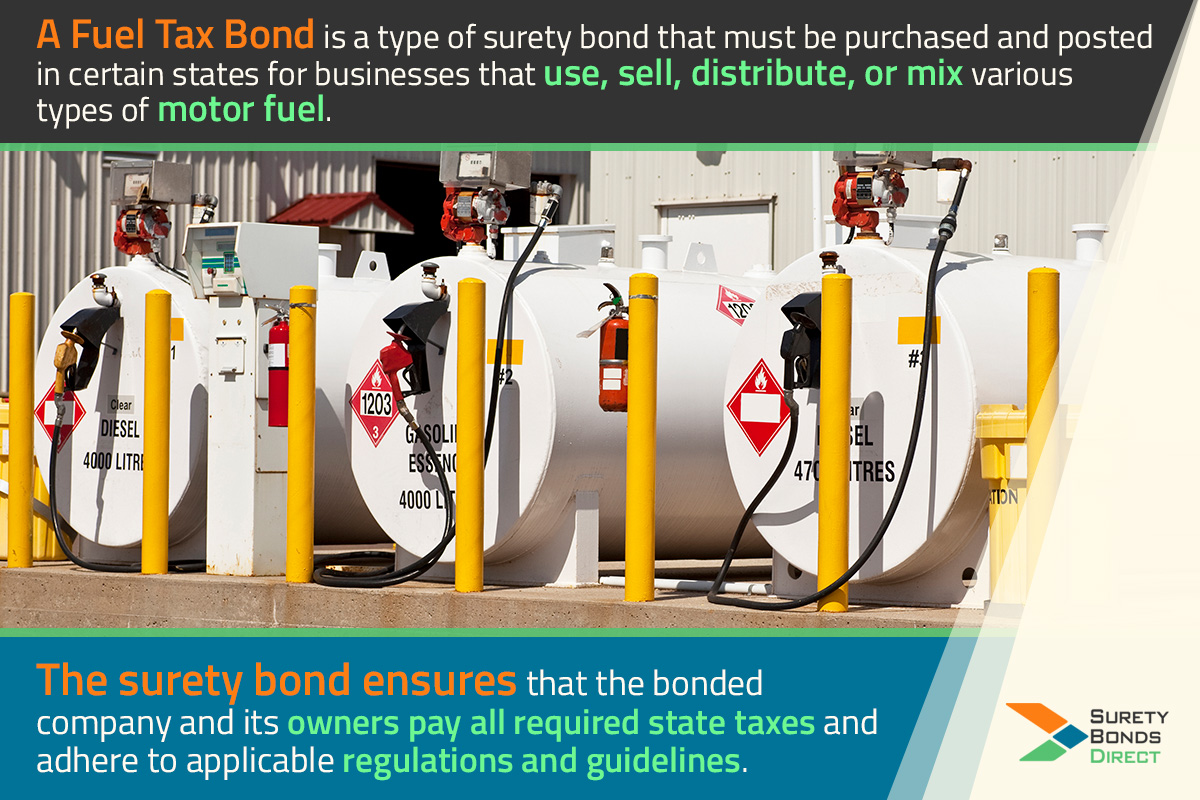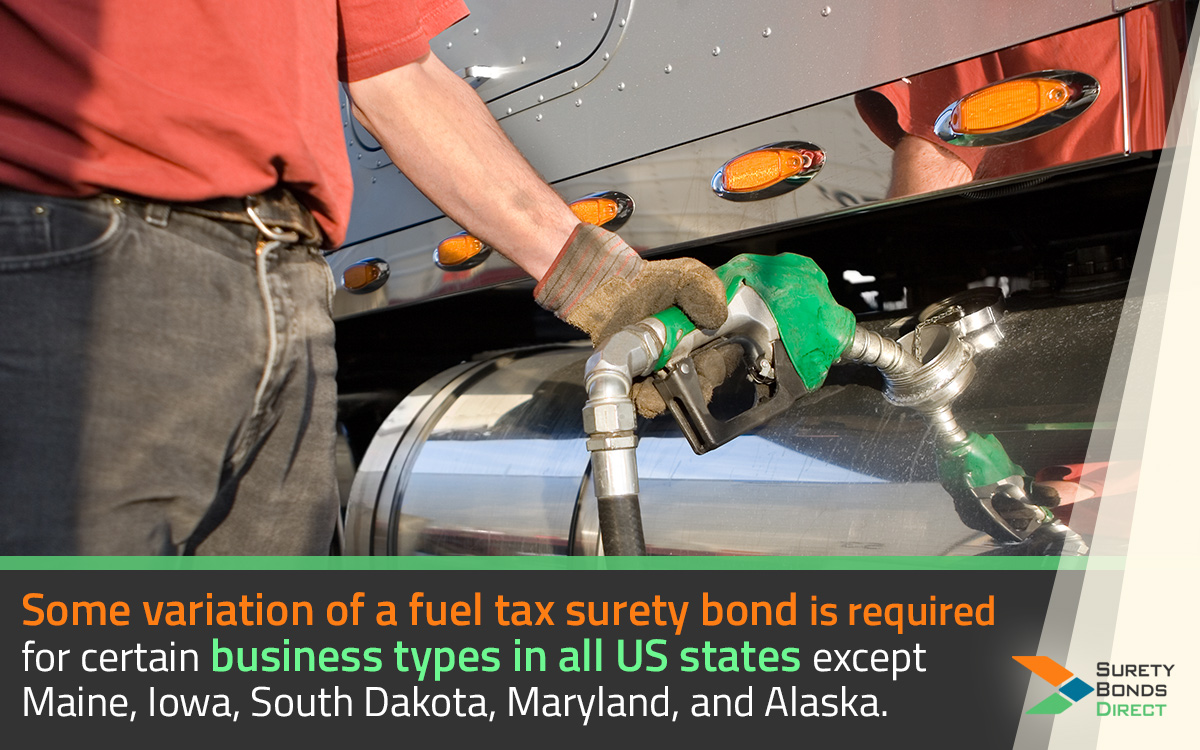A Fuel Tax Bond is a type of surety bond that must be purchased and posted in certain states for businesses that use, sell, distribute, or mix various types of motor fuel. The surety bond ensures that the bonded company and its owners pay all required state taxes and adhere to applicable regulations and guidelines. In some cases, the bond also protects consumers from the fuel seller's unethical actions or other violations of state laws pertaining to fuel sales and distribution. The bond coverage amount is usually either a set amount or a multiple of potential tax liability.
Some variation of a fuel tax surety bond is required for certain business types in all US states except Maine, Iowa, South Dakota, Maryland, and Alaska. Some of the more common state requirements are described below. For a complete list or to get more detailed information for other states see our list of fuel tax surety bond requirements by state.
Illinois Motor Fuel Financial Responsibility Bond
In the state of Illinois, the Department of Revenue (IDOR) requires a Fuel Tax Financial Responsibility Bond (REG-4-A) to secure tax obligations businesses that use, sell, distribute, or mix motor fuel in the state. The bond is required to legally conduct business and it guarantees that the taxpayer who has applied for the tax responsibility pays to IDOR all tax amounts becoming due under the law.
The Illinois Fuel Tax Bond is required in a coverage amount as set by the Department of Revenue of at least $1,000 per year. The price of the bond usually starts at $100 per year.

Texas Motor Fuel Tax Bond
Many motor fuel license holders are required by the Texas Comptroller of Public Accounts to furnish a Texas Fuel Tax Bond to ensure compliance with the provisions of the Texas statutes and payment of state fuels taxes.
Gasoline and diesel fuel tax suppliers, distributors, importers, exporters, aviation fuel dealers, or blenders must post a bond equal to two times the maximum amount of tax that could accrue on tax-free gasoline purchased or acquired during a reporting period. The minimum bond coverage amount is $30,000 and the maximum bond coverage is $600,000.
Dyed Diesel Fuel users must post a bond equal to two times the maximum amount of tax that could accrue on tax-free diesel fuel purchased or acquired during the reporting period. The minimum bond is $10,000 and the maximum bond is $600,000.
Lastly, Compressed Natural Gas (CNG)/Liquefied Natural Gas (LNG) dealers must furnish a surety bond equal to two times the maximum amount of tax that could accrue on CNG or LNG produced, purchased, acquired, sold or delivered during the reporting period. The minimum bond is $30,000 and the maximum bond is $600,000.
Georgia Motor Fuel Distributor Bond
Georgia has two fuel tax surety bond requirements, a Motor Fuel Tax Bond and a Motor Fuel Distributor Bond. Both bonds range in required coverage from $2,000 to $100,000.
The condition of the obligation in Georgia is that the named bonded principal listed on the bond has been duly registered as a Motor Carrier operator of vehicles subject to the provisions of Title 48, Chap. 9, Article 2 of Georgia Law. The fuel tax surety bond ensures compliance with all the requirements and laws as set forth in Title 48, Chap. 9, Article 2, of Georgia Law, and pays all taxes required, and any penalties assessed thereunder.
This bond is continuous in form from the effective date and is automatically extended at the end of each twelve months from effective date subject to receipt of all bond premiums due. Each twelve months constitute a new and separate obligation in the amount of the penal sum, or if changed by rider the amount of the penal sum as stated in rider from the inception date of rider forward. This bond may be canceled with notice by the surety company but not prior to a date when a tax refund has been paid pursuant to this bond.

Oregon Motor Fuel Dealer Bond
The state of Oregon has requires that motor fuel dealers, use fuel users and use fuel sellers all furnish surety bonds to the Oregon Department of Transportation, Fuel Tax Group.
Oregon Fuel Tax Bonds are types of surety bonds are specifically required by law for those who have made application to the Oregon Department of Transportation for a license to conduct business as a dealer in motor vehicle fuel, seller of use fuel, or user of use fuel as authorized and as mandated by ORS 319.010 through 319.880. The fuel tax bonds guarantee payment of all applicable state taxes, fees and penalties. The fuel tax bonds also ensure compliance with the conditions imposed by ORS 319.010 through 319.880 and subsections 1 through 5 of 319.990.
The state of Oregon mandates that timely monthly or quarterly reports are filed, and taxes due are paid pursuant to the state’s guidelines. The state will impose significant penalties if filings and tax payments are not handled accordingly. Such penalties often result in valid bond claims.
Colorado Fuel Tax Bond
The state of Colorado has imposed a Fuel Distributor Bond requirement. The bond is typically written in a coverage amount of $25,000 and covers a one-year term. The bond can be renewed for subsequent one-year terms as needed. The Colorado fuel distributor bond is mandated for those having made application to the executive director of the Department of Revenue of the State of Colorado for a license to act as a distributor of motor fuels and aviation fuels in the state of Colorado.
This fuel tax surety bond ensures compliance with all rules and regulations pertaining to motor and aviation fuel distribution while the bond is in full force and effect. Additionally, the bond guarantees prompt payment of all taxes, penalties, and interest due or becoming due under the law of Colorado relating to gasoline or special fuel, specifically under section 39-27-101 to section 39-27-218 of Colorado Revised Statutes.
More on Fuel Tax Requirements Nationwide
For more information on fuel tax requirements, pricing and other key terms by state, see this detailed fuel tax bond guide. You can also call 1-800-608-9950 to speak to a surety bond expert to answer any questions that you have.


